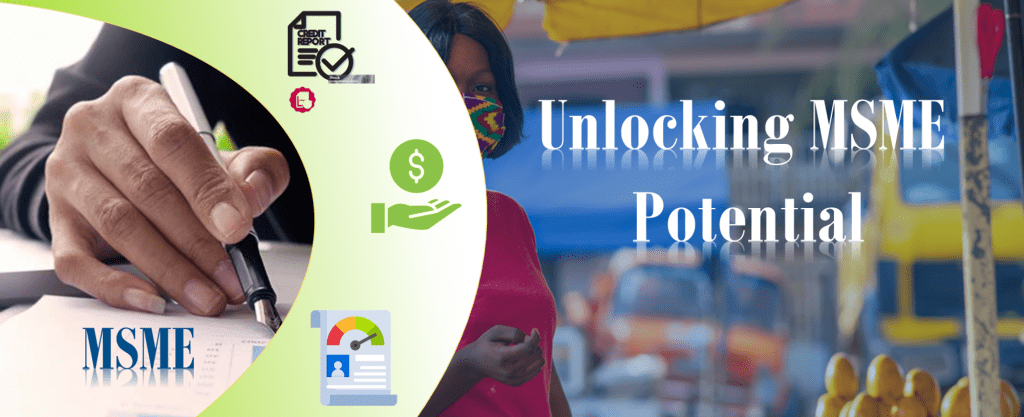Supporting MSME Credit
Micro, Small, and Medium Enterprises (MSMEs) are the backbone of Kenya’s economy, contributing approximately 40% to the country’s GDP and employing nearly 14.9 million people. These enterprises drive innovation, create jobs, and support livelihoods across diverse sectors. However, despite their significant economic role, MSMEs face persistent barriers in accessing formal financing. Of the estimated 7.4 million MSMEs in Kenya, only 1.5 million are formally registered. Informality, limited collateral, and sparse credit histories make it challenging for financial institutions to evaluate their creditworthiness.
Furthermore, MSMEs are often perceived as high-risk due to challenges such as inadequate management skills, difficulties in achieving product-market fit, and broader economic vulnerabilities, including climate change and fluctuating operational costs. To address these challenges, innovative solutions such as leveraging Credit Reference Bureau (CRB) data are reshaping the MSME financing landscape. By tapping into data-driven insights, stakeholders are unlocking new opportunities to enhance credit access, reduce risks, and foster inclusivity. The Credit Information Sharing (CIS) initiative, coordinated by CIS Kenya, is at the forefront of using CRB data to support MSMEs.
Established in 2013, CIS Kenya facilitates data sharing between financial institutions and CRBs, including TransUnion, Metropol, and Creditinfo. These data-sharing systems are transforming how lenders assess risk and provide credit to MSMEs. Here are ways CRB data-driven solutions are enabling MSME credit access:
- Data Collection and Analysis: CIS Kenya collects credit data from various sources, including banks and microfinance institutions, using a standardized Data Submission Template (DST). This data is processed by CRBs to generate detailed credit reports, offering lenders a comprehensive view of borrowers’ credit histories.
- Risk Assessment and Mitigation: By analyzing MSME credit data, CIS Kenya helps lenders identify key risk factors. This leads to the development of effective risk mitigation tools, such as customized credit scoring models and collateral alternatives like the Movable Property Security Rights Registry (MPSR), which allows MSMEs to use assets such as inventory or equipment as collateral.
- Targeted Lending Solutions: Through data analysis, CIS Kenya identifies the unique needs of MSMEs across various sectors. For instance, agriculture-focused MSMEs may require seasonal loans with flexible repayment terms, while manufacturing enterprises might benefit from asset-financing options.
- Policy Advocacy: Using insights derived from CRB data, CIS Kenya advocates for policies that support MSME credit access. For example, they work to influence the expansion of the Credit Guarantee Scheme, which minimizes lender risk, particularly for high-potential but underfunded enterprises.
The Government of Kenya has introduced several initiatives to promote MSME growth, including Credit Guarantee Schemes to reduce risk for lenders.
- Movable Property Security Rights Registry, which allows MSMEs to secure loans using movable assets.
- Gender-inclusive financing to bridge the credit gap for women-led MSMEs.
- At the same time, technology is revolutionizing MSME financing. Digital lending platforms, mobile banking, and alternative data sources like mobile payment records enable previously unbanked MSMEs to build credit histories. These innovations promote financial inclusion by expanding credit access to underserved segments, including women and youth.
The benefits of leveraging CRB data for MSME credit are significant:
- Improved Credit Access: By offering a more comprehensive view of creditworthiness, datadriven solutions allow lenders to extend credit to more MSMEs.
- Reduced Risk for Lenders: CRB insights enable lenders to make informed decisions, reducing the likelihood of defaults. Enhanced Financial Inclusion: Data-driven approaches expand access to previously excluded MSMEs, particularly those without traditional collateral.
- Sector-Specific Solutions: Lenders can tailor financial products to the unique needs of various sectors, such as agriculture or manufacturing.
For example, a recent analysis by Creditinfo Kenya (CIK) revealed that integrating behavioral data from mobile money platforms into credit assessments reduced loan default rates for MSMEs by 15%. Similarly, the adoption of the MPSR has allowed over 5,000 MSMEs to secure loans using movable assets since its launch.
To maximize the impact of CRB data-driven solutions, targeted efforts are required:
- Expanding the CIS Mechanism
- Include data from government-driven funds like the Hustlers Fund and Women’s Fund to enhance the credit profiles of informal MSMEs.
- Strengthening the MPSR and Credit Guarantee Scheme
- Policies should scale up these initiatives to ensure more MSMEs can access collateral-based financing.
- Sector-Specific Interventions
- Focus on underperforming but high-potential sectors such as manufacturing and agriculture to drive inclusive economic growth.
- Enhancing the DST
By including broader industry and geographical data fields, lenders can better target MSMEs and refine credit offerings.
MSMEs are critical to achieving Kenya’s Vision 2030 and the goals outlined in MTP 4. By embracing data-driven solutions, Kenya can unlock the full potential of these enterprises. The CIS initiative, coupled with sustainable financing practices and technology, ensures that more MSMEs can access affordable credit, achieve resilience, and contribute to long-term economic development.
As CIS Kenya, we remain committed to empowering MSMEs through innovative credit information sharing and capacity building. Together with our partners, we are shaping a more inclusive, sustainable, and prosperous financial ecosystem in Kenya.
Download the Report

